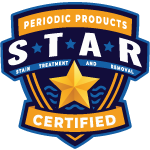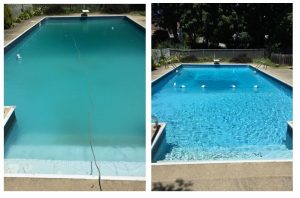This is a wonderful article I came across. Please note, this information comes from Swimming Pool Steve:
IS SALT WATER BAD FOR YOUR SWIMMING POOL?
Contents of Steve’s article are below:
Is Salt Water Bad For Your Swimming Pool?
Is salt water bad for your swimming pool? In a word, yes. This is information that most pool guys will not tell you. There are many different reasons that they might not tell you in clear terms like this why salt is bad for your pool. The most common reason is simply that they just don’t know any better. Also, if selling a salt water system to a customer any mention of damage to the pool as a result of salt would likely spoil the sale. In these cases the risks associated with salt water in pools is conveniently neglected during this conversation.
Sadly, there is also a wholesale lack of knowledgeable pool technicians within the industry. Of all the problems that can exist within a pool system, the problem of salt water being bad for your pool is probably the single most complicated one. In order to understand this problem your pool guy would need to have an advanced understanding of electrical theory, building standards and water chemistry and the reality is that most pool guys simply do not have these qualifications. Galvanic corrosion is the name of the electromechanical process that deteriorates your pool as a result of adding salt to it. If you want to make an informed decision about adding salt water to your pool then you need to learn as much as you can about this subject.
How Does Salt Water Damage Pools?
Galvanic corrosion is an electromechanical process where current will travel between two (different) metals within a galvanic couple. In simple terms, a swimming pool is just like a giant battery. To make a primary battery you would submerge differential metals within an electrolytic solution. An electrolytic solution is essentially water with salt in it…just like your pool. Since your pool is an electrolytic solution (since it has salt in it) and you also have differential metals within the system (such as galvanized steel, stainless steel, aluminum, titanium, brass and copper) then your pool actually becomes a giant battery.
The amount of current generated between metal components in a swimming pool is very small. It is not enough to feel shocks from the water, nor enough to be a concern for electrocution. The electric current generated is tiny. You could only detect this current with sensitive electronic testing equipment, or by virtue of seeing the damage as a result of this problem. The nature of the pool battery is such that the current being generated might be small, but it runs 24 hours per day, 7 days per week. The cumulative effect of this is a dramatically reduced service life for integral metal components of the pool.
The reality is that all swimming pools have this problem with galvanic corrosion if they use chlorine sanitizer. Chlorine is salt based so by adding chlorine to your pool you are actually adding salt. A salt water pool however has approximately ten times the salt level of a traditional chlorine pool. This is specifically significant since there is a linear increase in galvanic activity between 0 PPM salt all the way up to ocean water levels of 25,000 PPM of salt. If a salt water pool has ten times as much salt as a traditional chlorine pool then this means that the rate of galvanic corrosion also increases ten times when you switch to salt water. Doesn’t this sound like the kind of thing that someone should have mentioned to you when you asked about adding salt water to your pool? I sure think so, but even today you don’t need to look very far to find a pool guy boasting all about how “salt water pools are maintenance free” or “salt water is better than chlorine”. Salt water is not better than chlorine. Salt water is chlorine. Any person who tells you salt water is better than chlorine simply has no idea what they are talking about and fundamentally does not understand how salt water in swimming pools works.
How To Prevent Damage From Salt Water In Pools
So now you understand a little more about how salt water can damage your swimming pool and you can begin to ask the correct questions. Salt water can damage swimming pools but there are a number of things you can do to help prevent this problem (or at least dramatically reduce the amount of damage). Every swimming pool has something called a bonding grid. A bonding grid is different from grounding however this is another area where most pool guys can not explain the difference since they do not fully understand the difference between bonding and grounding for a pool. The bonding grid connects every piece of metal in and around your swimming pool (and equipment) with a heavy gage, low resistance conductor (copper wire). To understand why this is done you need to understand some basic electrical theory:
Voltage (volts) is equal to the current (amps) multiplied by the resistance (ohms)
If you rearrange this equation to solve for current it becomes current is equal to voltage divided by the resistance. This equation is called Ohm’s Law and is the fundamental basis of the relationship between electrical variables. This equation is incredibly important in both the world of electricity as well as in swimming pools as they relate to galvanic corrosion.
When you add salt to the pool what you are doing is changing (reducing) the electrical resistance of the water. Water, at least in a theoretical pure form, does not conduct electricity. It is the impurities in the water that increases the conductivity of the water. As you add impurities such as salt, the ability for the water to conduct electricity increases since the resistance in the water is reduced. This in turn affects the current being generated. As the resistance of the water goes down, the current goes up. Since current and resistance are inversely proportional, when you lower the resistance of the water with salt you are directly increasing the current passing between differential metals within a galvanic couple.
So if you have a bonding grid in your pool (you better!) then all metal components in and around the pool are connected with a low resistance wire. If every piece of metal is connected directly then it is not theoretically possible for a voltage to exist. To understand why this is, you need to understand that another way of saying “voltage” is to say “potential energy difference”. If there is a potential difference between any two points then it can be said that there is a voltage differential. By connecting all metal points within the pool system with a low resistance wire you are forcing them to have the same potential difference. Going back to the Ohm’s law equation and solving for voltage, voltage is equal to the current multiplied by the resistance. If the resistance is equal to zero, then at least theoretically the voltage will be equal to the current multiplied by zero…which is zero. In the real world it is not quite that simple, but you can see where this is going with the bonding grid.
How Bonding Reduces Galvanic Corrosion
So the bonding grid connects all metal components in the pool and prevents current from transferring, problem solved, right? Not so fast. In theory the bonding grid prevents voltage differential which means no current can flow. In theory. In practice, the bonding grid does not have zero resistance…it just has a very low resistance. The difference between zero resistance, and low resistance, is very important. With a low resistance the current is not zero, it is just lower than it would be without a bonding grid. Low levels of current, applied constantly 24/7 still has a cumulative negative effect on the metal components in your pool. To combat this there is another electrical theory that we can utilize.
Metals within a galvanic couple will act in a predictable way. The weaker metal (less noble) of the two will become an anode, and the stronger (more noble) metal will become a cathode. Since galvanic corrosion only occurs on the metal that is the anode in the galvanic couple, you can manually add a metal that is even less noble and this will become the new anode. The cathode metal in a galvanic couple experiences an enhanced protection from corrosion called cathodic protection. A sacrificial anode is a metal that is less noble than any metals currently in the galvanic couple. Most commonly sacrificial anodes are made from zinc or magnesium since these two metals are extremely low on the noble scale of metals. When you add a zinc anode to a pool system the zinc becomes the new anode and is the metal that will receive the brunt of the damage from galvanic corrosion, where the more noble metals of your pool system experience cathodic protection against corrosion.
Is it just that simple – add a sacrificial anode to your pool and no more galvanic corrosion, right? Not exactly. Again when we get deeper into the practical application of this theory we discover that it is not a perfect system. While a sacrificial anode dramatically reduces pool equipment damage from galvanic corrosion, it does not 100% stop the process. There is no silver bullet that will absolutely stop galvanic corrosion since localized anodization can still happen.
One of the factors that impacts the strength of galvanic corrosion is the proximity of the differential metals. The closer the metals are to each other, the stronger the current transfer. If you have a brass screw installed into an aluminum or stainless steel light niche, which is tied into galvanized steel walls (or steel rebar in the base of a concrete pool) then having a sacrificial anode installed 50 feet away in the pump room will not stop galvanic corrosion from happening between these metals in close contact with each other. In this case using bolt on anodes may help. There are sacrificial zinc anodes that you can install directly on lights, as well as ladder anodes and handrail anodes. You can also buy zinc anodes that are designed to sit inside skimmer strainer baskets or pump strainer baskets.
What Are The Benefits Of Salt Water?
So now you have a much better understanding of the down sides of salt water chlorine in a swimming pool so you can make an informed decision as to whether you want it for your pool. As I have detailed above, adding salt to your pool carries inherent risks and even taking additional steps for protection such as adding sacrificial anodes does not guarantee you will avoid problems with galvanic corrosion. So why does anyone want salt water? Well, a lot of people don’t. Many pool builders have stopped installing salt water systems due to the problems associated with damage to the pool, but pool owners are still very interested in this technology.
When I see someone say that salt water pools are maintenance free this makes me want to remove my skin with a potato peeler. The only difference between a salt pool and a traditional chlorine pool is that in a salt pool you are automating the chlorine manufacture process. A salt water pool still requires every last bit of maintenance, care and upkeep that a traditional chlorine pool needs. The only difference is that you no longer need to buy and transport chlorine products (for the most part). Further to this, some salt water pools require more maintenance than traditional chlorine pools since the specific type of chlorine made from salt water electrolysis has an extremely high pH (above 12) which will constantly cause the pH in your pool to drift high.
High pH in a chlorine pool is very significant. Chlorine technically works optimally at a pH range of near to 5 (similar to strong black coffee). At pH of 7.2 the chlorine is still active enough to be useful for swimming pools. At a pH of 8.2 or higher, which is extremely common in salt water chlorine pools, the chlorine is over 90% inactive in the water. You can still measure the free chlorine value, it simply can not do its normal job of killing bacteria in the water. Salt water pools require constant chemical correction to the pH to keep them within the normal operating range for swimming pools.
The real benefits of salt water is the convenience of adding salt once per year and generating chlorine from this. No more need for weekly trips to the pool store to get chlorine. The water also feels softer on the skin and eyes and you are slightly more buoyant in salt water. Chlorine from salt water is also generated in a slow and even method which results in a baseline level of chlorine in the pool at all times. Traditional chlorine treatments are a constant cycle of peaks of chlorine followed by a slow decay into a chlorine deficit. A salt water system generating a constant and steady supply of chlorine is preferable as opposed to the peaks and valleys of chlorine levels normally associated with shock treatments. Even this however can be replicated by an erosion feeder for chlorine so this benefit is not totally unique to salt water.
Quite honestly, the biggest benefit of salt water pools is the perceived benefit by the user. Which is fine, as long as you are not experiencing this perceived benefit at the detriment of the longevity of your pool. Now that you understand the truth about salt water, and the risks of adding salt water to your pool, you have the information you need to decide whether salt water is right for you or not. If you still want to add salt water to your pool then you should read my salt water chlorinator reviews which compares every brand name salt water system on the market side by side. You will learn which are the best systems to buy, and more importantly which ones that you should avoid.
Salt Water Conversion
So what you really want to know is, can you convert your pool over to salt water? You want the benefits but you are worried about the risks of damaging the pool somehow. This is good. This tells me that you might be OK to convert to salt water chlorine. The fact that you have read this page and now understand the concerns associated with damage from salt water conversion is a good sign that you are making an informed decision, not listening to a sales pitch from a pool store about how salt water is better than chlorine. In my professional opinion salt water is not great for pools, but it is not a hard no either. There are some benefits to some people that are worth the risk. I think if you have a pool that is properly bonded, including all of the equipment, and you have installed an inline anode in the pump room, and you monitor your pool for any signs of localized anodization, then it is OK to convert to salt water. If you go this route then just remember:
The higher the salt level that the system runs at, the greater the concern for damage from galvanic corrosion. Choose a salt chlorine generator that operates at the minimum value, about 3000 PPM. If you live in an area where you can buy a low salt unit that operates at 1500 PPM that is a great option. Avoid the systems that operate at 4000 – 6000 PPM. For a complete list of brand name salt water chlorine generators that I prefer to use, including the PPM salt requirements for each, read my article on salt water chlorinator reviews. If you would like to read a complete comparison review of every salt water system on the market including models from Hayward, Pentair, Jandy, Zodiac, CompuPool, AutoPilot, Intex, CircuPool and Solaxx then read this ultimate guide to salt water systems.




9 Comments
Thank you for sharing such good information about saltwater pools!
This is a very interesting and detailed article, thanks for sharing.
Really an amazing guide. Very valuable content. I believe in professionals so this is a very useful article for everyone. Thank you very much for sharing..
Great article and very well explained. I believe in professionals so this is a very useful article for everyone. Many thanks for your share.
Elisa,
Thank you for your comment on the issue with salt water swimming pool systems. Although customers are told that salt water systems for swimming pools are easy, they do require as much chemical maintenance as a regular chlorine pool and there is the added concern of rising pH and corrosion.
Thanks!
David is right. Salt Water pool require a higher level of service than your typical swimming pool. This may be due to the fact that we are in Las Vegas, however our company does charge roughly 10-15% more to service a salt water pool.
Thank you for the comment!
Salt water feels great, but it does take a little more testing and time to take care of a salt water system. Often times people don’t understand that a salt water system IS producing chlorine to clean the pool water. This production often raises the pH which in turn can cause staining on the surfaces. All salt pools have a little bit of iron in the water because salt is mined with the iron. Using a CuLator PowerPak 1.0 is a good way to prevent staining when using a salt water system.
Yes, salt chlorine generator produce chlorine from salt. But I read that there are no chloramines in salt water pools, or chlorine by-products that cause such a smell and irritate the skin and eyes. Is that the case?
No, that is not the case. That is a myth. When sodium chloride (NaCl) is broken down into salt and chlorine, the chlorine combines with the “bad” stuff and creates chloramines. So, salt water pools do have chloramines. Chlorine generators create chlorine and when chlorine combines with an organic the material is oxidized and creates chloramines. I hope this helps!